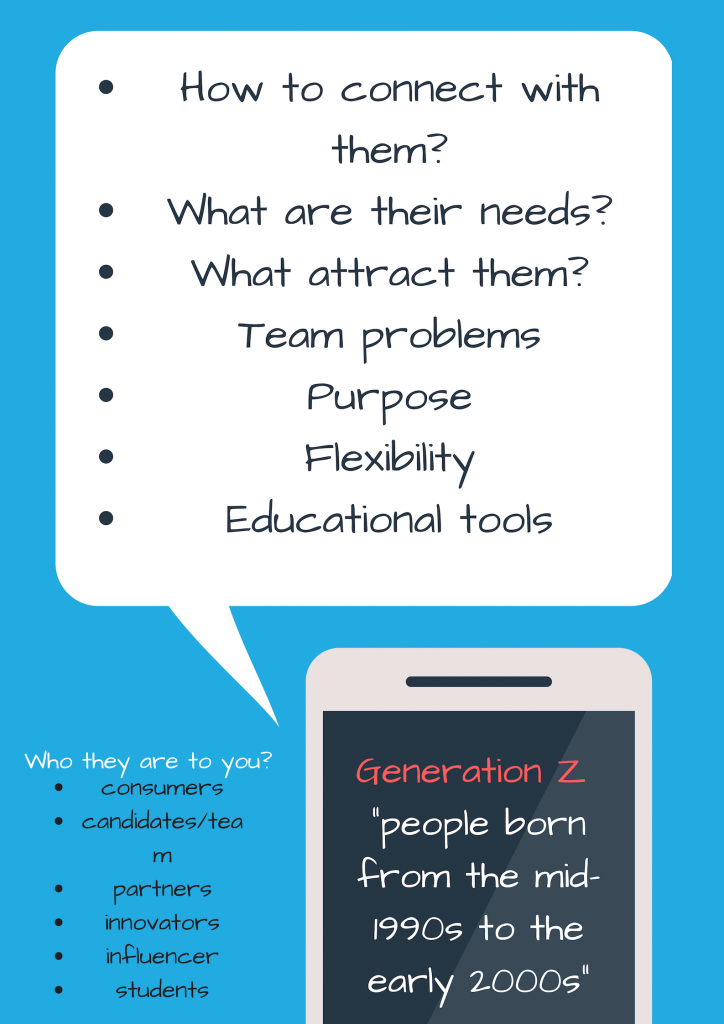What do you think about Generation Z?
On the 27th of September 2018 our CEO, Aga Gajownik was invited to run a roundtable at Agile Business Conference where participants discovered more about Gen Z.
The goal was to find answers to the following questions:
How to connect with them?
What are their needs?

We started by describing Generation Z. The terms used include:
- Individuals born between 1995 and 2010
- Educated
- Multitaskers
- Non-focused
- Short attention span
- Using voice messages a lot
- Open to learning
- Lifestyle focus
We interact with them on a daily basis. They are our:
- Potential candidates
- Customers
- Team members
- Students
- Influencers
- Potential business partners
During our discussion, we realised that there were many challenges we face when interacting with representatives of Gen Z. Those include different communication and motivation styles, unclear purpose, a different approach to flexibility and education. We even ended up asking questions if young people needed teachers having access to all the online tools available.
In order to find some answers we created a Generation Z avatar named Sarah.


Going through all the elements of behaviour, approach, and perception the exercise was insightful and eye-opening. To summarise, we looked at their approach to Agile and noticed that some representatives of this generation are agile natives in many aspects of their life.
After the event we asked our colleague Bogdan Cristian Anton, a member of this generation for some feedback. Here is what he said:
Value-driven – gen. Z has a strong longing to find meaning in their lives. With the unfathomable amount of information that is available to us, starting to feel lost is easy. So finding what is genuinely valuable for each individual is very important in order to give them a strong incentive. This can range from the subjective financial comfort (not necessarily gains) to a true sense of being helpful to the world.
Voice messages – the current generation is by far not a fan of phone calls. It may be because they respect the privacy and comfort of others and do not want to disrupt their schedule or because they themselves don’t always feel comfortable with what they have to say. Generation Z prefers actually meeting people in person, communication through social media channels or sending voice recordings. The latter is a very good way of getting your point across easily, without needing to take more time to write it out, while also allowing the recipient to think of a good response and get back in their own time. It allows for more empathy and connection than writing while taking away the pressure and immediacy of a phone call.
Open to learning – while there have been people that knew what they were doing and were not particularly interested in learning many new skills, this is no longer the case in present times. People begin needing to reinvent themselves more and more often, and the new generation will never know otherwise. It’s something we all need to learn as well and as soon as possible: how to learn and how to be open to changing ourselves.
Teachers – this is my last point, and I think it implies a bit of a change of perspective from the traditional educational system. It’s not to say that formal education is no longer necessary, but that it is by far no longer sufficient for fast pace of the world and its evolution – technological, social, you name it, but nothing can be ‘learnt in school’ and remain completely relevant 10 years, months, weeks or even days later. This leads us to become a learn/teach culture, where we are all sharing our knowledge and always keep an eye out to make good use of all that we understand”.
All of the above is subjective but fascinating. We will run the more in-depth research about the topic so we can better serve young people. What is your opinion about Generation Z?




